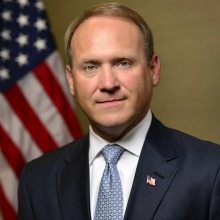
Vince Bertram is President and CEO of Project Lead The Way (PLTW), a leading provider of STEM educational programs used in middle and high schools around the country.
Bertram joined PLTW from a background in education, serving as superintendent of the Evansville Vanderburgh School Corporation. He holds a doctoral, specialist, master’s, and bachelor’s degrees from Ball State University, as well as a Master of Education Policy and Management from Harvard University.
WashingtonExec got the chance to talk with Bertram about PLTW, the current education system, company partnerships and ways to get involved, and more. Read on below for our interview with Bertram.
WashingtonExec: Could you start by telling us a little about your background and how you got involved with Project Lead the Way (PLTW)?
Vince Bertram: My involvement with Project Lead the Way (PLTW) began in 2001/2002 school year in which we adopted PLTW in a large urban high school in which I was principal. Then as a school superintendent of a large urban district we set out to put PLTW in all of our middle and high schools. I observed significant changes in school culture and overall performance through Project Lead the Way. I then had the privilege to lead this organization.
__________________________________________________________________________________
It is very rewarding to see our growth and the amazing work our students and teachers are doing across the country.”
___________________________________________________________________________
WashingtonExec: How active or involved are you in the Northern Virginia and/or DC area?
Vince Bertram: The region is a great opportunity for us. In fact we have just expanded our regional staff, and are working with our university affiliates to grow the DC area.
WashingtonExec: How is this different from the Advanced Placement (AP) program for High School students?
Vince Bertram: We partner with the College Board and their excellent programs, but beyond assessments we provide the entire curriculum for middle and high schools; primarily in engineering and biomedical sciences. Our program is all project and activity based so students develop problem solving and critical thinking skills, and learn to effectively collaborate on projects. We also provide rigorous end of course assessments which are often used by universities to award college credit.
WashingtonExec: How are you all aiding in increasing U.S. education in math and science?
Vince Bertram: We have a severe shortage of students pursuing rigorous science, technology, engineering, and mathematics curricula, which leads to a competitive workforce crisis. The United States has nearly 3.7 million unfilled jobs because of the skills gap, and it is estimated that by 2018 we will have an additional 1.2 million unfilled STEM related jobs because of the skills gap. Yet we have 23 million people unemployed or underemployed.
_________________________________________________________________________________
Over the past 15 years, Project Lead The Way has produced compelling results in student performance. Our students generally do better in math and science, but they also take more math and science – primarily because they understand the context in how to use math and math as a tool as opposed to learning math in isolation. It’s when students must apply math and science in rigorous courses they begin to understand the relevancy.”
_________________________________________________________________________
WashingtonExec: Could you tell us a little about your large partnerships with SAIC and Northrop Grumman? How are these companies involved?
Vince Bertram: Partnership teams are absolutely critical for us on a couple of levels. One is the local level – we work with companies, industry experts to help us develop curriculum but also to help local schools implement our program, to sustain it, to mentor students, and to provide program funding for schools. We have many outstanding corporate partners including SAIC, Northrop Grumman, Lockheed Martin, Chevron, 3M, Cargill, John Deere, and Toyota.
WashingtonExec: A lot of our readers are small business contractors or entrepreneurs so how can a small tech company get involved with PLTW?
Vince Bertram: It’s not just about the size of the company, but about the company’s interest and commitment to education. All companies have workforce needs and they can reach out directly to their local schools, or they may contact PLTW at PLTW.org and we will assist them.
WashingtonExec: Could you give some examples opportunities for local businesses to become involved?
Vince Bertram: There are a lot of opportunities. For instance, I was just with a group in St. Cloud, Minneapolis which a local manufacturing company students by providing company tours and mentors. They provide guest speakers and many activities to help students understand the skills they need to be successful in the job market. There isn’t a predetermined or standard way for companies to engage with our schools – we attempt to align the needs of the organization with our schools.
WashingtonExec: Is there a certain type of technology company that you would like to engage with more?
Vince Bertram: We do focus on the job market and the trends and things that our students may need to learn or that would give them an advantage in the job market. For instance, we are adding a course in software engineering and computer science because it is one of the fastest growing careers.
WashingtonExec: I was looking over your university partners and I did not see Virginia Tech or UVA, are you looking to partner with those universities?
Vince Bertram: We are always looking to expand our partnerships in places where there is growth opportunity. For instance we work with the University of Maryland Baltimore County, Old Dominion University, Stevenson University – we just introduced Duke University as a biomedical science affiliate. We also recently worked with UVA professor Robert Tai on a White Paper synthesizing the dozens of research studies on Project Lead the Way. In other words, there are many ways that we partner with universities.


